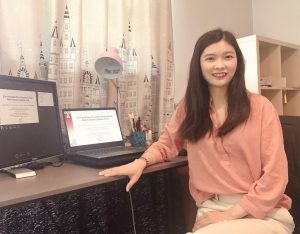On August 20, 2020, Shuimei was waiting at the Philadelphia Airport for a flight to Los Angeles as she was to start her internship as a radar signal processing engineer at Aptiv, Agoura Hills, CA. Headquartered in Dubin, Ireland, Aptiv is a global auto parts company, and its Advanced Safety and User Experience (ASUE) division is leading the automotive radar industry for autonomous driving.
Looking at her boarding pass, she realized that it was exactly the same day four years ago when she landed at this airport for the first time to start her career as a Ph.D. student in Electrical Engineering at the Advanced Signal Processing (ASP) Lab, Temple University.
 Photo: Shuimei virtually presents her paper at the 2020 IEEE Sensor Array and Multichannel Signal Processing Workshop
Photo: Shuimei virtually presents her paper at the 2020 IEEE Sensor Array and Multichannel Signal Processing Workshop
When Shuimei was admitted as a Ph.D. student, the Temple University Graduate School selected her to receive the very competitive Presidential Fellowship, the most prestigious fellowship that Temple awards to its students. This Fellowship provides full support at a higher level than the standard stipend paid to teaching or research assistants (TA/RA) and includes tuition and medical coverages, for the first and fourth years. The Fellowship not only gave Shuimei the great recognition, but also gave her the flexibility to work on research topics of her choosing.
In the other two years she was supported through a combination of RA and TA assignments. The RA support came from the National Science Foundation (NSF) for a project developing new radio spectrum sharing techniques, whereas the TA assignment gave her valuable teaching experience and rich interactions with undergraduate students by taking the advantage that Temple allows TAs to instruct undergraduate lab courses.
Shuimei’s research work spans, in chronological order, spectrum sharing, target localization exploiting distributed unmanned aerial vehicle (UAV) networks, sparsity and machine learning-based time-frequency analysis, and sparse array processing for direction-of-arrival (DOA) estimation. Her experience in these different topics showcases her diverse research interests and also witnesses her uneasy endeavor to discover passionate research directions. Her research journey has built up her expertise and confidence in conducting research activities and has led her to productive outcomes in the second half of her career at the ASP Lab.
Shuimei started her Ph.D. research on spectrum sharing developing interference cancelation and radio astronomical imaging techniques. She produced several papers on this topic and expanded her expertise to joint radar-communication systems sharing the same spectrum. During this course, she was exposed to array signal processing, robust beamforming, compressive sensing, and convex optimization techniques.
A significant turning point while working towards her Ph.D. degree was an unexpected pregnancy in Shuimei’s second academic year. As she later wrote in her Ph.D. dissertation acknowledgment, her daughter, Celine, is “the best present I have received during my Ph.D. studies.” However, her pregnancy and the first several months of taking care of baby Celine were undoubtedly her biggest challenges in her time as a Ph.D. student, straining her both mentally and physically. She needed to make crucial decisions while still taking courses and working as a TA. Shuimei used to count every minute of her day and had to rush between classrooms and her apartment while breastfeeding and caring for her infant child. Fortunately, many people, both on- and off-campus, offered helping hands to support her through this very challenging but rewarding time. Her very stressful schedule and the newfound responsibility as a mother made Shuimei stronger, more responsible, and more determined. As a result, during her third academic year, Shuimei’s research activities became more collaborative, yet she herself grew more focused and productive.
After she entered the fourth year of her Ph.D. study, Shuimei spent more time on her main dissertation topic, namely, strategies for sparsity-based time-frequency analyses, while maintaining her work on sparse array design and processing in collaboration with lab mate Ammar Ahmed among others. That winter break was very memorable as she worked to revise her journal paper, “Low-rank Hankel matrix completion for robust time-frequency analysis,” countless times to meet the satisfaction of her advisor. Shuimei found this process very painful in the moment, but after the paper was readily accepted for publication in the October 2020 issue of IEEE Transactions on Signal Processing, she was able to feel accomplishment from her hard work. The lessons she learned during the revision process helped her prepare her next journal papers with ease and efficiency. A conference paper, “DOA estimation exploiting interpolated multi-frequency sparse array,” was written in the same time period and later received the only Best Student Paper Award at the 2020 IEEE Sensor Array and Multichannel Signal Processing (SAM) Workshop. These two papers were very impactful in building Shuimei’s confidence and allowing her to take pride in her work.
During her internship at Aptiv, she continued her research activities and was involved in supervising younger lab mates. While enroute to Los Angeles, she was making final revisions on her fifth journal paper, which extends her award-winning IEEE SAM Workshop paper into a full-length journal paper. While interning at Aptiv, she completed another journal paper with the assistance of a new lab mate, Saidur Pavel, on the development of machine learning-based time-frequency analyses.
Shuimei’s hard work has been very fruitful and has given her confidence not only for her continued Ph.D. studies, but also while she was searching for the next step in her career. Even though many job positions have been affected by the COVID-19 pandemic, she easily got the opportunity to intern at Aptiv and, shortly after her Ph.D. dissertation defense in December 2020, she became a full-time radar signal processing engineer in the same ASUE division.
As a Ph.D. student, Shuimei produced fruitful outcomes and maintained a 4.0 GPA. The challenges she met in her four and half years at the ASP Lab gave her unforgettable memories and shaped her up as both a mother and a scientist with maturity, responsibility, confidence, and love.